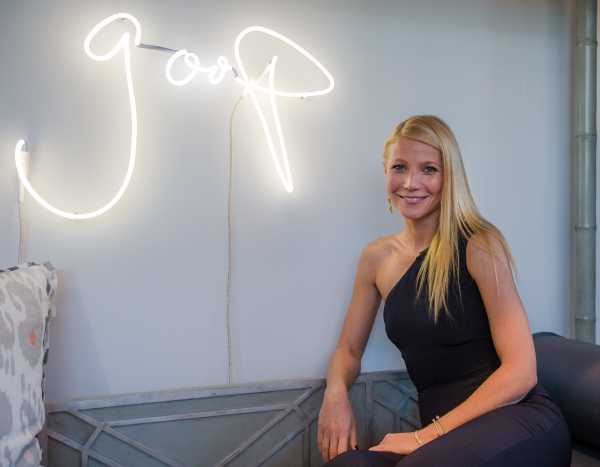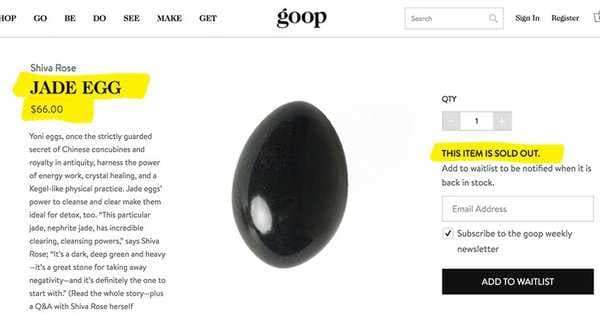
On an alarmingly regular basis, Gwyneth Paltrow’s lifestyle company Goop publishes new morsels of health bullshit.
And as the Goop website has emerged as a reliably laughable source of pseudoscience, a small army of journalists (myself included), doctors, researchers, and bloggers has evolved to pounce on Goop’s claptrap as soon as it’s out. We explain why jade eggs for vaginas, $30 sex “dust,” and body stickers that “promote healing” are misleading drivel. In the best cases, we use Goop’s bunk to teach people about how actual science works. It’s practically a parasitic relationship.
Recently, though, I’ve been asking myself what impact all this debunking is having.
The first time I wrote about Paltrow’s health bullshit, and her “cleanse specialist” Alejandro Junger, was five years ago, in 2013. Two years later, the Alberta professor Tim Caulfield published his book Is Gwyneth Paltrow Wrong About Everything?, about the dangerous influence celebrities have on our decision-making. CNN, the Guardian, and Stephen Colbert have all weighed in. Over the years, OB-GYN and blogger Jen Gunter has spilled so much digital ink on Paltrow’s health shenanigans that she got Goop to issue its first-ever direct response to critics last summer.
In the time we’ve been debunking Paltrow, the stories and books pointing out the absurdity and potential harms of Goop’s claims have been widely read. It’s clear they resonate with certain readers.
But the Goop empire has also grown and expanded in influence. A recent New York Times profile of Paltrow, aptly titled, “How Goop’s Haters Made Gwyneth Paltrow’s Company Worth $250 Million,” confirmed that Paltrow courts controversy because it helps her wellness empire thrive.
So I set about to understand why Goop appears to be winning — and what impact, if any, critics have had on the brand.
Despite the debunking, Goop appears stronger than ever

Goop isn’t a public company, so we don’t know its precise revenue or how well it’s currently doing. But we do know that in 2016, Goop raised $15 million to $20 million in venture capital — a sign of the business’s strength. And Times journalist Taffy Brodesser-Akner reported that Goop is now worth $250 million, according to a source who knows the brand.
Over the past two years, the company has also expanded in a few key ways: It held its first health summits and launched a quarterly magazine, which will allow the brand to reach new and broader audiences.
Rather than being cowed by the debunkers, it seems Goop has been emboldened by us. In the Times, Brodesser-Akner confirmed that every time there’s blowback about some dubious vaginal maintenance routine or detox therapy featured on Goop, blogs, articles and tweets pop up in a cacophony of criticism. That creates what Paltrow called “cultural firestorms” that draw traffic to the site. “I can monetize those eyeballs,” Paltrow told a Harvard business class.
In a statement released last summer, Goop also disparaged critics like Gunter and doubled down on Goop’s “open-minded” world view: that people need alternative solutions for the health problems that ail them, such as “lectin-limited diets” — solutions the medical establishment has been too narrow-minded to see:
Harvard Business School brand analyst Jill Avery told me in 2017 this response may have indeed been a calculated move to strengthen their brand and draw their customers closer. “The segment of consumers who engage with Goop are interested in alternative, homeopathic remedies,” Avery said. “So, when Dr. Gunter challenges Goop, she challenges the ideological foundation of its consumers as well.”
What’s more, Avery said, the Goop response evokes “themes from feminism, Eastern medicines and philosophies, and anti-establishment politics to incite [Paltrow’s] consumers to action: to make them feel as if they are under attack, to reassure them that their ideology will be supported by Goop, and to arm them with arguments to help them defend themselves.”
To be sure, Goop has tapped into a real longing out there. Traditional medicine has failed people in many cases, and often lacks solutions for the most common health woes — chronic pain, obesity, Alzheimer’s. You need not look any further than the raging opioid epidemic to find cases where medicine has also done more harm than good.
But as Tim Caulfield told me, that doesn’t make it okay to throw away the scientific paradigm and accept any junk claim that comes along. “The idea that somehow science doesn’t have all the answers, science isn’t necessarily a morally good force, displays a misunderstanding of what science is. It’s not an ideology, not an industry, it’s not people. It’s a process.” Yes, pharmaceutical companies and doctors have sometimes done horrible things. But that doesn’t make the scientific method any less valuable; it means we need to strengthen it.
Still, wouldn’t the negative press surrounding Goop’s health claims have made some dent in their business? Avery doesn’t think so. “The old adage ‘no news is bad news’ comes to mind here,” she said.
I also posed this question to Larry Light, author of Six Rules for Brand Revitalization and the chief executive of the brand consulting company Arcature. “You can’t attack a belief with facts,” he reminded me. He agreed the Goop debunking would only galvanize its fans and thought that Paltrow’s new summits and magazine would further expand the Goop cult and deepen its members’ beliefs.
All this doesn’t mean, however, that calling out the Goopshit has been in vain.
We debunkers have probably helped inform and equip the public with sound health information, even if we’ve failed to convince Goop fans. This has been a fascinating chapter in the ongoing public debate about alternative medicine and health. But this episode is also an opportunity to think more about how to tilt the balance toward evidence-based thinking and away from Goopshit.
We need to think about how to prevent Goopshit from taking off
I once asked a group of doctors and health researchers for their advice on the best practices for fighting “fake news” and misinformation, since these problems are nothing new in the medical world.
Some of these health professionals came around to a belief I am now wholeheartedly convinced of: The best way to stop bogus health claims from taking off is to teach people how to think critically about the information they receive from a very early age.
Researchers from Europe and Africa recently worked to develop curricula — a cartoon-filled textbook, lessons plans — on critical thinking skills aimed at schoolchildren. In 2016, they tested the materials in a big trial involving 15,000 schoolchildren from Uganda’s central region.
The results of the trial were published in the Lancet last May, and showed a remarkable rate of success: Kids who were taught basic concepts of how to think critically about health claims massively outperformed children in a control group.
This work, from a group of evidence-minded research nerds, is the closest thing we have to a recipe book for how to prevent health bunk from spreading in the first place: Instead of trying to change people’s beliefs with facts, we need to teach them to call bullshit on pseudoscience drivel in the first place.
I’m a journalist, not an educator or policymaker. But for the educators and policymakers reading this, please take a hard look at your school curricula and the critical thinking skills they offer. It may be too late to dent Paltrow’s brand among her acolytes, but you might be able to stop the next Goop train from taking off.
Further reading:
- Doctors have decades of experience fighting “fake news.” Here’s how they win.
- Gwyneth Paltrow split with Condé Nast because they wanted her to use a fact-checker
- The one chart you need to understand any health study
- This researcher may have discovered the antidote to health bullshit
- I watched Alex Jones give his viewers health advice. Here’s what I learned.
- Why reporting on health and science is a good way to lose friends and alienate people
- Trump understands what many miss: people don’t make decisions based on facts
- The 5 rules of success for highly effective lifestyle gurus
- This professor put Gwyneth Paltrow’s health advice to the test. The truth is even worse than you’d think.
Sourse: vox.com






